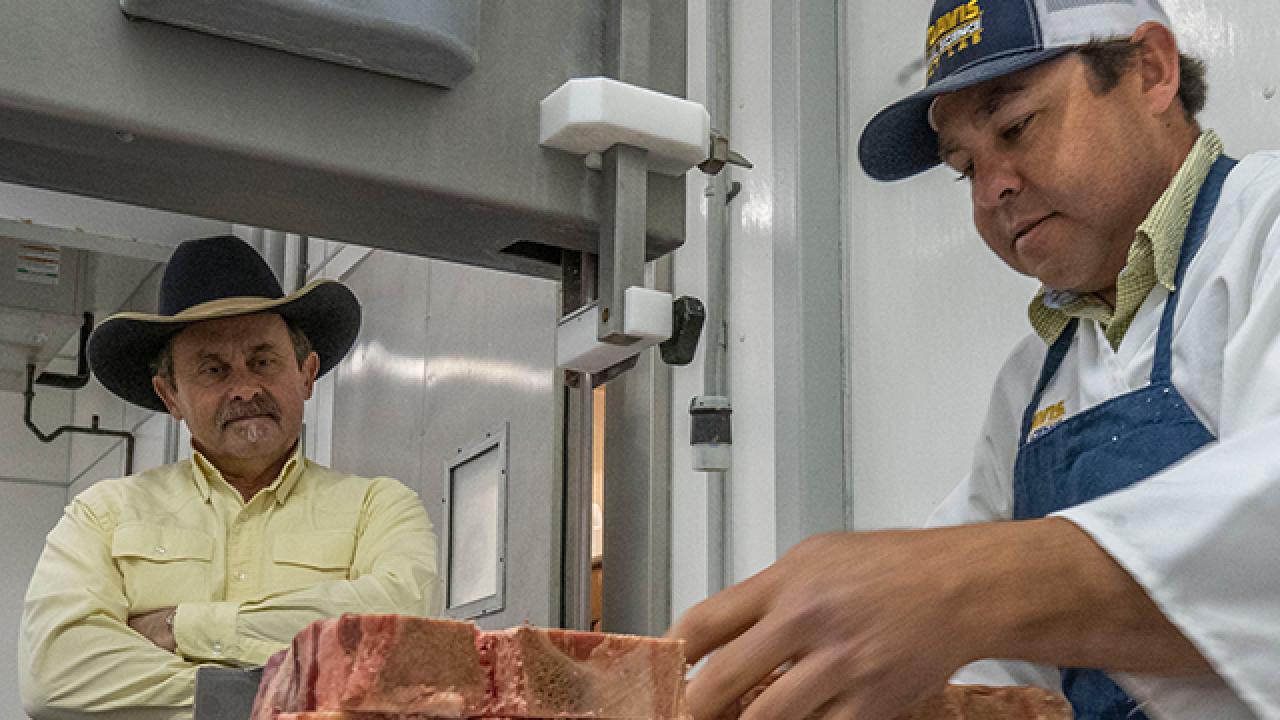
Like Father, Like Son
When Caleb Sehnert was growing up, he naturally was curious about what his dad did for work. So, on his way to summer camp, he’d park his bicycle at the UC Davis Meat Lab and go inside to visit with his father, Dan.
What he got was a first-hand look at how beef cattle, hogs, sheep and goats are harvested, processed and packaged. Dan was manager of the lab for 14 years starting in 1981. Caleb, now 37, landed the same job in 2008 and still holds it.
Cajun Style Tri-Tip Rub
The rub recipe came from a book that Dan Sehnert gave as a gift to his son, when Caleb first started at the Meat Lab.
1 Tbsp Cracked black pepper
2 tsp Paprika
2 tsp Garlic powder
2 tsp Salt
1 tsp Dried thyme
1 tsp Dried oregano
1 tsp Mustard powder
½ tsp Cayenne pepper
Ironically, neither one of them envisioned themselves teaching students and working with UC Davis faculty on animal science projects. Fresh out of Cal Poly Pomona, Dan had other ideas.
“I’m from Nebraska and wanted to get back home,” he said. “I already turned down two job offers and then this one came up. I figured I’d stay for a couple of years.”
Nearly 40 years later, Dan is a well-known staffer on campus. He has been the facilities coordinator for the Department of Animal Science since 1993.
Caleb studied agronomy at UC Davis and wanted to build a career in range management, but a terrible automobile accident derailed his plans. He’d always been around livestock and spent time on his grandparents’ cattle ranch in Southern California. After recovering from the accident, he took a job at the UC Davis Center for Equine Health. Then the meat lab job opened up.
“I knew the potential of the meat lab,” Caleb said. “It was something I knew I could do at that time in my life, so I figured it was worth a shot—one of the best decisions I’ve ever made.”
The UC Davis Meat Lab is located in the Harold Cole Facility, named after a former animal husbandry professor. Built in 1969 with a grant from the National Institutes of Health, it is the only such facility in the University of California system.
Caleb loves teaching animal science students and coaching them on how to make their award-winning sausages, hams, chorizo, jerky and other meat products. Every year students enter a competition with the other California colleges with meat labs—both Cal Poly campuses, Chico State and Fresno State—at the California Association of Meat Processors annual convention. Sometimes they compete in the commercial division, as well. They’ve won overall, nine out of the last 11 years.
“They can put that award on their resume and it looks really good when they go out and find a job in industry,” he said. “They’ve already created one of the best products in California!”
The meat lab is also where many animal science students get their first look at the anatomy of different livestock species—comparing, for instance, the more complicated digestive tract of ruminants like sheep or cattle with the simple stomach of a pig.
Over a two-week period, Caleb typically teaches more than 15 labs with 20 students each. All animal science undergrads planning to go to vet school someday must take the meat lab, and for some of them it’s a little much to see how an animal is harvested.
“There’s always a few students out in the hallway who are rethinking their major and their life plans,” he said. “Then there are three or four asking a ton of questions and getting hands-on experience stretching out the small intestine. They will become good veterinarians.”
A USDA inspector is always on hand to make sure the proper protocols for humane slaughter and sanitation are followed, such as making sure all animals are unconscious before being harvested.
“You’re not going to learn an animal inside and out better anywhere else,” Dan noted. “If you’ve never seen an animal harvested before, this is the place to see it because these animals are healthy.”
The animals are typically involved in university research projects. For instance, a number of nutrition trials in recent years have focused on feeding cattle garlic, orange peels, even seaweed to reduce the burping of methane gas. Sensory panels are routinely held to find out how those feed additives affect the taste and tenderness of the meat.
“We harvest only UC Davis-raised animals,” Caleb said. “We know their breeds, diets, age, medication history and average daily gain.”
Dan wasn’t part of the hiring committee and doesn’t supervise Caleb. He didn’t even know his son applied for the job. But he is very proud of Caleb’s work. “You don’t know how many times I’ve been told he’s doing a way better job than I did,” he jokes.
“I never thought when I was a little kid that I’d wind up working here,” Caleb said. “Now I can’t imagine working anywhere else.”